Abstract
OBJECTIVE: To review current literature on the hereditary aspects of prostate cancer and to evaluate the importance of family history in history taking and screening for prostate cancer. DATA SOURCES: MEDLINE was searched for articles in English or French published between Jan. 1, 1956, and Oct. 31, 1994, with the use of MeSH headings "prostatic neoplasms," "genetics" and "chromosomes." Additional references were selected from the bibliographies of articles found during the search. STUDY SELECTION: Case-control studies involving the incidence of prostate cancer and relative risk (RR) of such cancer in the families of men with this disease, compared with a control group, were included. Only studies in which prostate cancer was diagnosed on the basis of histologic tests were included. Animal investigations were excluded. DATA EXTRACTION: Ten case-control studies were evaluated critically in terms of design, case and control groups, the size of the samples and statistical results. The incidence of prostate cancer in the families of cases, compared with that in the families of controls, and differences in RR were reviewed. DATA SYNTHESIS: The lifetime risk of prostate cancer is 9.5% and of death from prostate cancer is 2.9% for a man 50 years of age. For first-degree male relatives of men with prostate cancer, the calculated RR ranges from 1.7 to 8.73. "Hereditary" prostate cancer is a term applied to a specific subset of patients with prostate cancer. This form of prostate cancer is transmitted by a rare, autosomal, dominant allele with high penetrance; it accounts for an estimated 43% of early-onset disease (affecting men less than 55 years of age) but only 9% of all prostate cancer in men up to 85 years of age. A greater number of affected family members and early onset among family members are the most significant predictors of risk. CONCLUSIONS: Recent confirmation of the familial clustering and Mendelian inheritance patterns of some prostate cancer has important implications. It increases the potential for directed research into the causes of prostate cancer and for refinements in the current screening practices to detect this common disease. Manoeuvres to detect prostate cancer should be started earlier among men with one or more first-degree relatives with the disease than among other men.
Full text
PDF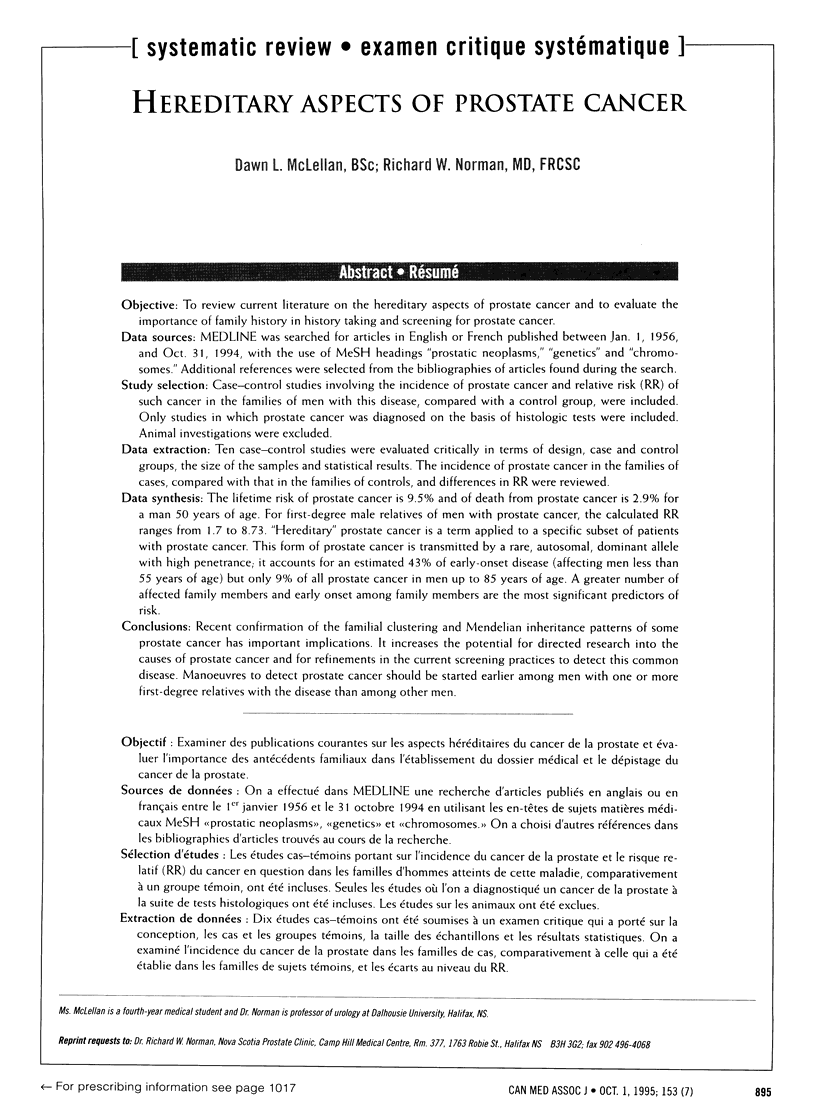
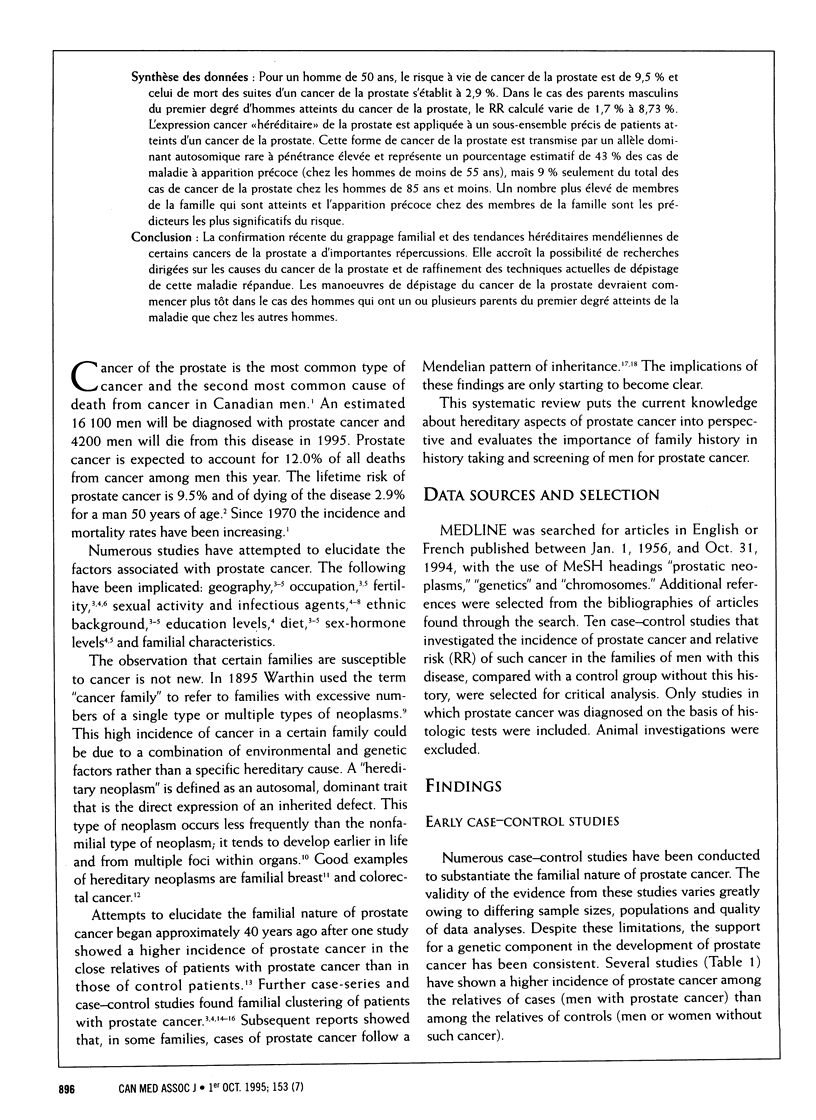
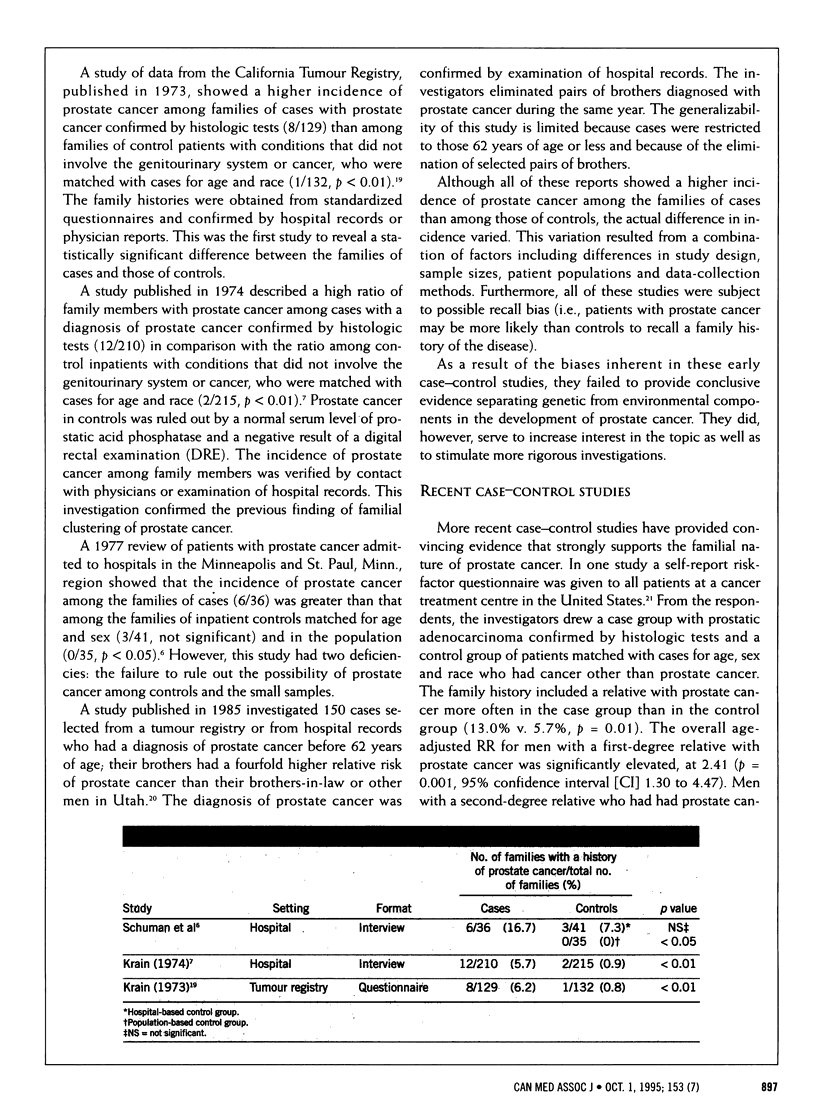
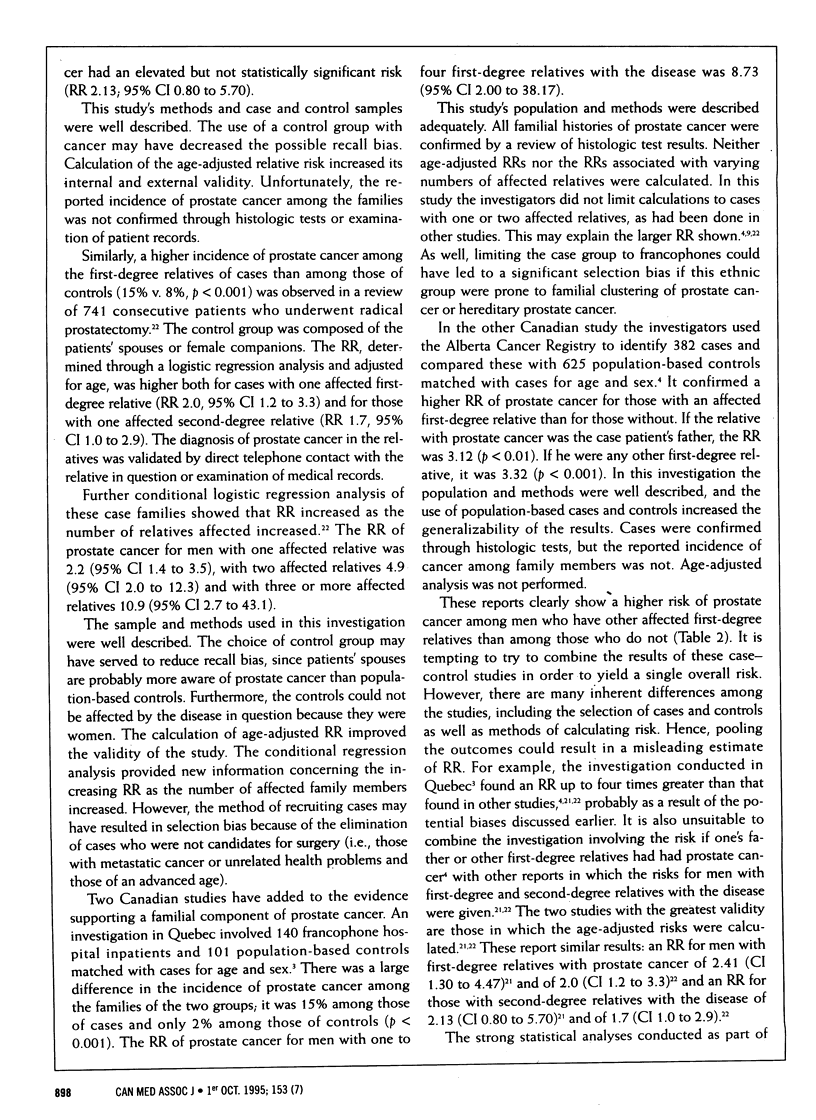
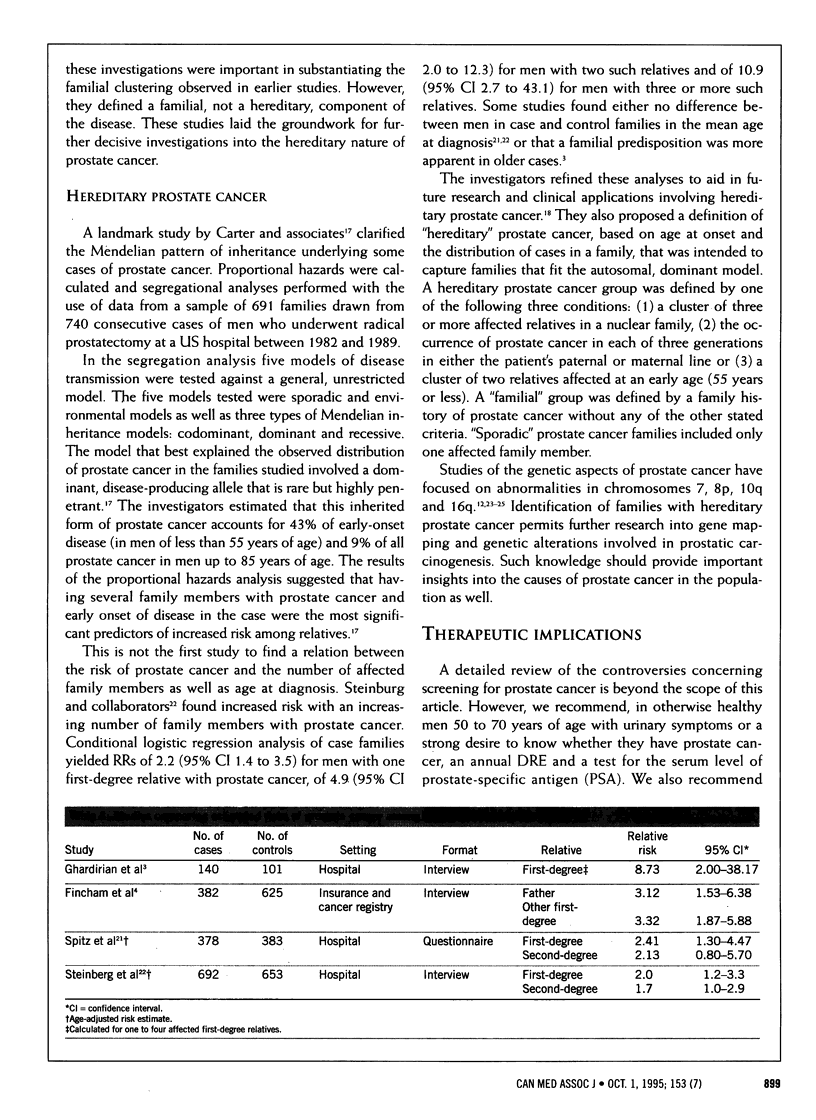
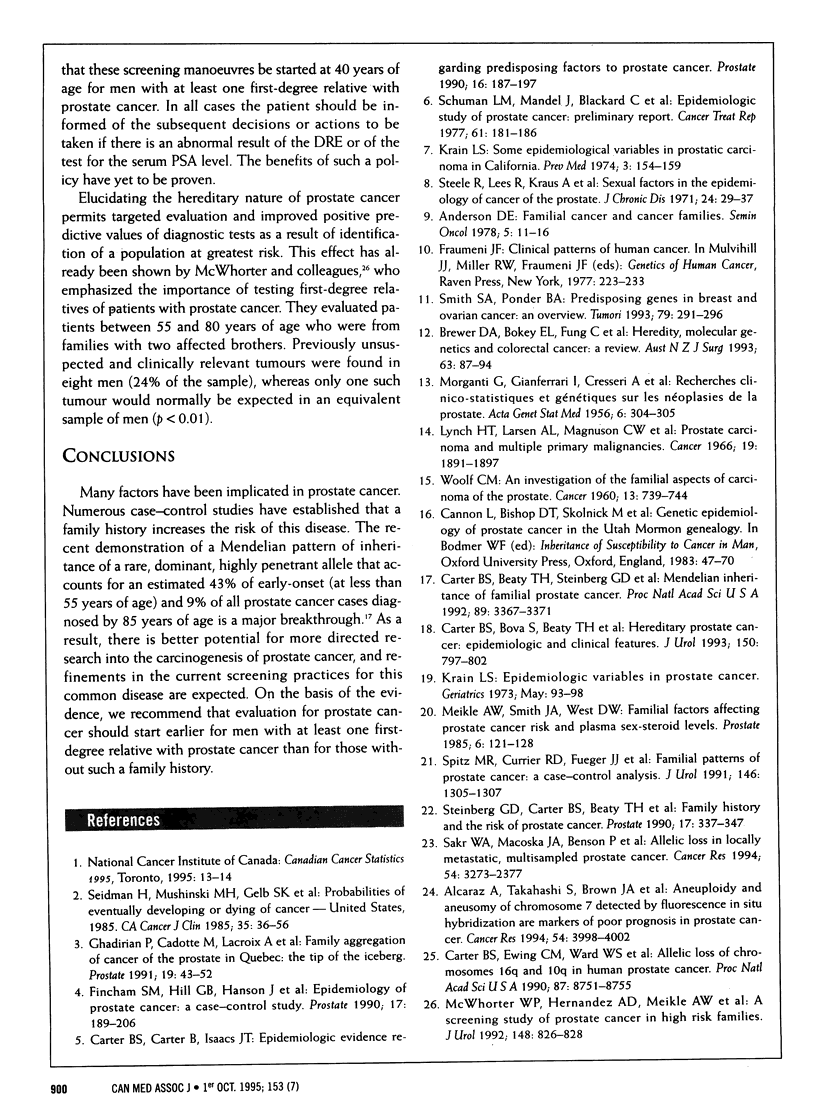
Selected References
These references are in PubMed. This may not be the complete list of references from this article.
- Alcaraz A., Takahashi S., Brown J. A., Herath J. F., Bergstralh E. J., Larson-Keller J. J., Lieber M. M., Jenkins R. B. Aneuploidy and aneusomy of chromosome 7 detected by fluorescence in situ hybridization are markers of poor prognosis in prostate cancer. Cancer Res. 1994 Aug 1;54(15):3998–4002. [PubMed] [Google Scholar]
- Anderson D. E. Familial cancer and cancer families. Semin Oncol. 1978 Mar;5(1):11–16. [PubMed] [Google Scholar]
- Brewer D. A., Bokey E. L., Fung C., Chapuis P. H. Heredity, molecular genetics and colorectal cancer: a review. Aust N Z J Surg. 1993 Feb;63(2):87–94. doi: 10.1111/j.1445-2197.1993.tb00051.x. [DOI] [PubMed] [Google Scholar]
- Carter B. S., Beaty T. H., Steinberg G. D., Childs B., Walsh P. C. Mendelian inheritance of familial prostate cancer. Proc Natl Acad Sci U S A. 1992 Apr 15;89(8):3367–3371. doi: 10.1073/pnas.89.8.3367. [DOI] [PMC free article] [PubMed] [Google Scholar]
- Carter B. S., Bova G. S., Beaty T. H., Steinberg G. D., Childs B., Isaacs W. B., Walsh P. C. Hereditary prostate cancer: epidemiologic and clinical features. J Urol. 1993 Sep;150(3):797–802. doi: 10.1016/s0022-5347(17)35617-3. [DOI] [PubMed] [Google Scholar]
- Carter B. S., Carter H. B., Isaacs J. T. Epidemiologic evidence regarding predisposing factors to prostate cancer. Prostate. 1990;16(3):187–197. doi: 10.1002/pros.2990160302. [DOI] [PubMed] [Google Scholar]
- Carter B. S., Ewing C. M., Ward W. S., Treiger B. F., Aalders T. W., Schalken J. A., Epstein J. I., Isaacs W. B. Allelic loss of chromosomes 16q and 10q in human prostate cancer. Proc Natl Acad Sci U S A. 1990 Nov;87(22):8751–8755. doi: 10.1073/pnas.87.22.8751. [DOI] [PMC free article] [PubMed] [Google Scholar]
- Fincham S. M., Hill G. B., Hanson J., Wijayasinghe C. Epidemiology of prostatic cancer: a case-control study. Prostate. 1990;17(3):189–206. doi: 10.1002/pros.2990170303. [DOI] [PubMed] [Google Scholar]
- Ghadirian P., Cadotte M., Lacroix A., Perret C. Family aggregation of cancer of the prostate in Quebec: the tip of the iceberg. Prostate. 1991;19(1):43–52. doi: 10.1002/pros.2990190105. [DOI] [PubMed] [Google Scholar]
- Krain L. S. Epidemiologic variables in prostatic cancer. Geriatrics. 1973 May;28(5):93–98. [PubMed] [Google Scholar]
- Krain L. S. Some epidemiologic variables in prostatic carcinoma in California. Prev Med. 1974 Mar;3(1):154–159. doi: 10.1016/0091-7435(74)90070-x. [DOI] [PubMed] [Google Scholar]
- Lynch H. T., Larsen A. L., Magnuson C. W., Krush A. J. Prostate carcinoma and multiple primary malignancies. Study of a family and 109 consecutive prostate cancer patients. Cancer. 1966 Dec;19(12):1891–1897. doi: 10.1002/1097-0142(196612)19:12<1891::aid-cncr2820191216>3.0.co;2-h. [DOI] [PubMed] [Google Scholar]
- MORGANTI G., GIANFERRARI L., CRESSERI A., ARRIGONI G., LOVATI G. Recherches clinico-statistiques et génétiques sur les néoplasies de la prostate. Acta Genet Stat Med. 1956;6(2):304–305. [PubMed] [Google Scholar]
- McWhorter W. P., Hernandez A. D., Meikle A. W., Terreros D. A., Smith J. A., Jr, Skolnick M. H., Cannon-Albright L. A., Eyre H. J. A screening study of prostate cancer in high risk families. J Urol. 1992 Sep;148(3):826–828. doi: 10.1016/s0022-5347(17)36733-2. [DOI] [PubMed] [Google Scholar]
- Meikle A. W., Smith J. A., West D. W. Familial factors affecting prostatic cancer risk and plasma sex-steroid levels. Prostate. 1985;6(2):121–128. doi: 10.1002/pros.2990060202. [DOI] [PubMed] [Google Scholar]
- Sakr W. A., Macoska J. A., Benson P., Grignon D. J., Wolman S. R., Pontes J. E., Crissman J. D. Allelic loss in locally metastatic, multisampled prostate cancer. Cancer Res. 1994 Jun 15;54(12):3273–3277. [PubMed] [Google Scholar]
- Schuman L. M., Mandel J., Blackard C., Bauer H., Scarlett J., McHugh R. Epidemiologic study of prostatic cancer: preliminary report. Cancer Treat Rep. 1977 Mar-Apr;61(2):181–186. [PubMed] [Google Scholar]
- Seidman H., Mushinski M. H., Gelb S. K., Silverberg E. Probabilities of eventually developing or dying of cancer--United States, 1985. CA Cancer J Clin. 1985 Jan-Feb;35(1):36–56. doi: 10.3322/canjclin.35.1.36. [DOI] [PubMed] [Google Scholar]
- Smith S. A., Ponder B. A. Predisposing genes in breast and ovarian cancer: an overview. Tumori. 1993 Oct 31;79(5):291–296. doi: 10.1177/030089169307900501. [DOI] [PubMed] [Google Scholar]
- Spitz M. R., Currier R. D., Fueger J. J., Babaian R. J., Newell G. R. Familial patterns of prostate cancer: a case-control analysis. J Urol. 1991 Nov;146(5):1305–1307. doi: 10.1016/s0022-5347(17)38074-6. [DOI] [PubMed] [Google Scholar]
- Steele R., Lees R. E., Kraus A. S., Rao C. Sexual factors in the epidemiology of cancer of the prostate. J Chronic Dis. 1971 Jun;24(1):29–37. doi: 10.1016/0021-9681(71)90056-7. [DOI] [PubMed] [Google Scholar]
- Steinberg G. D., Carter B. S., Beaty T. H., Childs B., Walsh P. C. Family history and the risk of prostate cancer. Prostate. 1990;17(4):337–347. doi: 10.1002/pros.2990170409. [DOI] [PubMed] [Google Scholar]
- WOOLF C. M. An investigation of the familial aspects of carcinoma of the prostate. Cancer. 1960 Jul-Aug;13:739–744. doi: 10.1002/1097-0142(196007/08)13:4<739::aid-cncr2820130414>3.0.co;2-e. [DOI] [PubMed] [Google Scholar]


